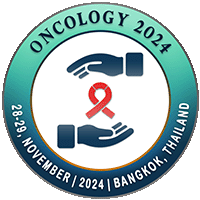.jpg)
Suzy Ramos Rocha
University of São Paulo, BrazilTitle: Functional capacity of women with breast neoplasm undergoing palliative chemotherapy
Abstract
Purpose:
To evaluate the
functional capacity of women with breast neoplasm undergoing palliative
chemotherapy. Background: Breast
neoplasm have the highest incidence and mortality rate among women worldwide.
In Brazil, 38% of diagnosed women have worse prognosis and low survival, which
directs therapeutic efforts to extended or exclusive palliative care. Methods: Cross-sectional study,
ethically approveded, with a no probabilistic sample of 100 medical records of
breast cancer women 18 or older submitted to outpatient palliative chemotherapy
during 2018 in the National Cancer Institute, Rio de Janeiro. From june to
september 2019, the authors developed and applied 27 questions to evaluate
socioeconomic characteristics, lifestyle and previous and/or current diseases/oncological
treatment, the performance status (PS/ECOG - score value 0,1,2,4,5). Univariate
analysis was carried out through chi-squared Pearson test between the PS scale
and the other variables (p ? 0.005). Outcomes:
66% of the sample were < 50 years, 53% with primary education, 87% income of
1 to 2 wages, 62% unemployed, 43% single/divorced/widow, 45% had some
comorbidity. Regarding clinical data, 95% had invasive ductal carcinoma, with
positive hormone receptor (64%) and histological grade 1 and 2 (57%). 75% were oncological treatment prior to
palliative chemotherapy, 50% have bone and visceral metastasis, 68% asthenia, 55% fatigue, 53% pain, 53%
nausea and vomits. Chemotherapy schemes
were associated with inappetence (p=0.00) and weight loss (p=0.001) symptoms.
From all complications, 31% were neuropathy, 21% medullary compression
syndrome, 9% neutropenia and 28% death. Performance status 0 (49%), 1 (39%),
and 2 (12%) were prevalent (mild and moderate activity restriction). Discussion and Implications:. Despite
the majority women were PS 0 and 1, most of them have social vulnerability,
manageable symptoms and other moderate or severe complications, even occurring
early death. Thus, the monitoring of functional capacity is essential for
better flow assistance, improve social support and women's quality survival.
Biography
Nurse graduated
from the Federal University of Ceará (2010 to 2014), with integration to the
Maternal and Mammary Health Research and Extension Project (2010-2017), with an
emphasis on breast cancer care. Specialist in Emergency at the State University
of Ceará (2017). Master in Nursing in Health Promotion from the Federal
University of Ceará (2017). Specialist in Stomatherapy from the State University
of Rio de Janeiro (2019). Specialist in the residency modality in Oncology by
the National Cancer Institute (2020). She is currently a student of the
Doctoral Course of the Postgraduate Program in Nursing in Adult Health-PROESA
(2020-current).

